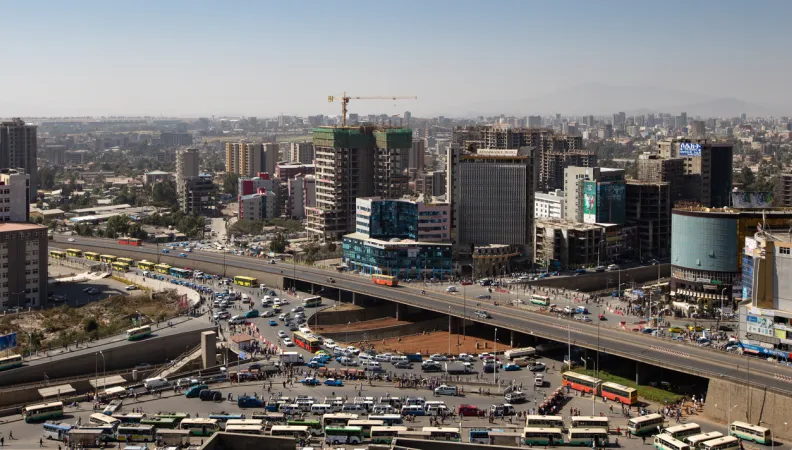Share the page
The ARIA initiative: enabling DFIs to extend their vital role to Africa’s frontier markets
Published on
- Vivianne Infante Director & co-leader ARIA initiative British International Investment
- Alex Kucharski Manager & co-leader ARIA initiative British International Investment

Private Sector & Development #41 - Acting in fragile contexts: financing, partnerships, innovation
This edition of the Private Sector & Development magazine is devoted to fragile contexts. The multiple challenges facing fragile countries converge, compounding and feeding off each other. In these countries, we have to simultaneously deal with emergency situations, combat poverty over the long term and factor in the impacts of climate change.
Development finance across Africa is unevenly distributed, with 25 of its smallest economies receiving only 4% of investments since 2010. Yet, the Africa Resilience Investment Accelerator initiative (ARIA) is showing that focus, resources and collaboration can enable greater investment in these ‘frontier’ markets, by addressing both the internal (DFI-specific) and external (country-specific) challenges.
Development finance is key to supporting the much-needed private sector development and economic growth in the poorest and most fragile markets in Africa (here referred to as ‘frontier markets’). ARIA, was set up by British International Investment (BII) and the Dutch Entrepreneurial Development Bank (FMO) as an initiative to unlock investment in frontier markets through physical presence, origination support, technical assistance, and fostering collaboration among DFIs and development partners. The focus for ARIA currently is on Sierra Leone, Liberia, Benin, DRC and Ethiopia. Its work shows that with focus, dedicated resources and collaboration, more investment in frontier markets is possible.
The distribution of development finance across Africa is uneven, and many frontier markets have been left behind. A recent ARIA analysis of 4,000 non-sovereign investments made since 2010 by nine major development finance institutions showed that of the US$72.3 billion invested, 46% was concentrated in the three African countries with the largest economies (South Africa, Nigeria, Kenya). Conversely, the bottom 25 countries received only 4% of investments. ARIA has built a database of over 400 investment opportunities relevant to DFIs in their current markets of focus, offering an opportunity to analyse investment demand. Some insights follow:
- The companies assessed by ARIA require more than US$ 2 billion, with most seeking debt or a mix of debt and equity.
- Investment opportunities are concentrated in the financial services, agriculture, manufacturing, and energy sectors.
- Companies are mostly flexible and willing to take loans in foreign currency. Nevertheless, liabilities in foreign currency expose those earning in local currency (such as manufacturers substituting imports) to possible currency devaluation. Local currency funding would obviate this risk.
- Most opportunities are in the US$ 5 to 50 million range.
- Companies often require technical assistance to prepare them for investment and to meet DFI requirements. Areas of technical assistance needed include E&S and governance; strategy; market-readiness; financial, operational, and environmental social governance (ESG) advice; document preparation; and technical expertise.
CHALLENGES IN ATTRACTING DFI INVESTMENT INTO FRONTIER MARKETS
Some of the challenges related to investing in frontier markets are well documented. A recent ARIA survey of 40 staff members across DFIs exemplified the external country-specific barriers to DFIs investing more in frontier markets. Currency risk was the major obstacle. This is due to contexts of broader macro-economic instability, often found in frontier markets, which for international investors hoping to repatriate profits, makes investing more challenging. Also identified as major or moderate obstacles by most respondents were political instability and insecurity, the lack of proper physical infrastructure, and poor regulatory environments and compliance (resulting in unreliable corporate governance and financial information).
While DFIs cannot better control the external barriers to investing, a number of internal barriers also contribute to limiting their investments in frontier markets. The obstacles most often identified as major or moderate were misaligned internal incentives, limited capacity and resources to invest in identifying development opportunities, DFI investment instruments not being tailored to the available opportunities – for example, excessively high pricing requirements, or lack of access to concessional funding – and lack of strategic focus in frontier markets, as well as existing conflicting priorities. Some respondents noted that, despite the overall interest in investing more in frontier markets, growing requirements in terms of E&S, KYC, compliance and financial returns are becoming more restrictive.
COLLABORATION IN FRONTIER MARKETS IS VITAL
ARIA was formed as an initiative integrated within BII and FMO (current funders of the initiative) and works closely with other DFIs – such as Proparco, Swedfund, Norfund, DFC and IFC – to unlock greater investment in frontier markets. In these markets, collaboration on market knowledge, opportunities and upstream work prepares companies for investment and can reduce transaction costs, while co-investing can reduce risks. Collaboration between DFIs and development partners is particularly important in frontier markets in order for various tools to achieve the joint objective of supporting private sector development. ARIA has built partnerships with development parties present and active locally, for example, with the UKAid-funded Invest Salone, in Sierra Leone, to attain their shared objective of unlocking investments. In the last two years, ARIA has assisted 10 deals to enter DFI pipelines, with one having been approved by Proparco. It has supported 18 companies with technical assistance, with more forthcoming. Together with its partners, ARIA is also working on ecosystem initiatives to address cross-cutting barriers to investment.
In summary, frontier markets need DFI investment. ARIA’s work illustrates that more investment is possible if DFIs are able to address the internal barriers to better serving these markets. More focus on, and adaptation of tools and processes is needed, alongside technical assistance to support investment readiness and to build the investment ecosystem. Collaboration among DFIs and between DFIs and development partners is also key to ensuring more investment takes place.


